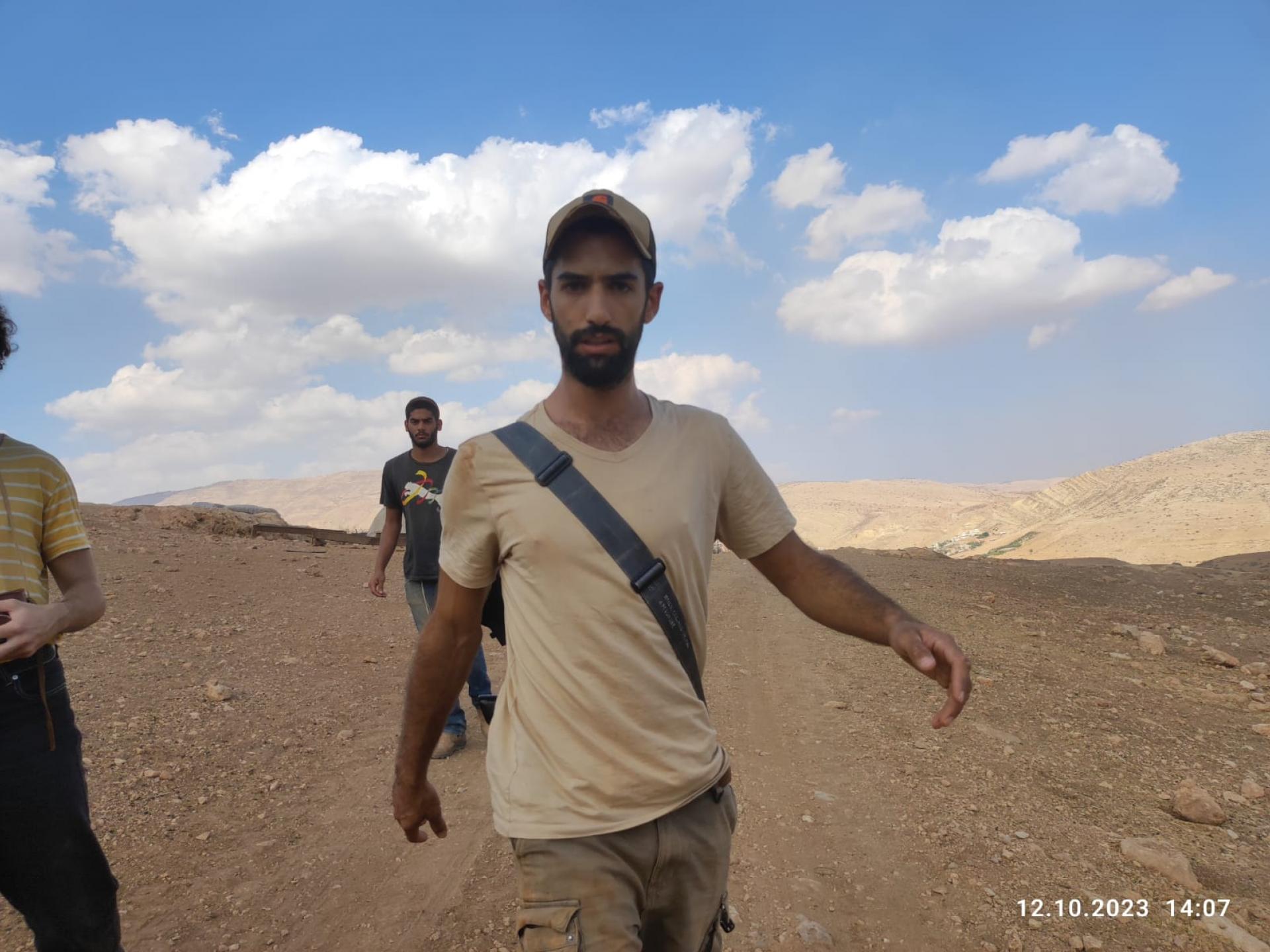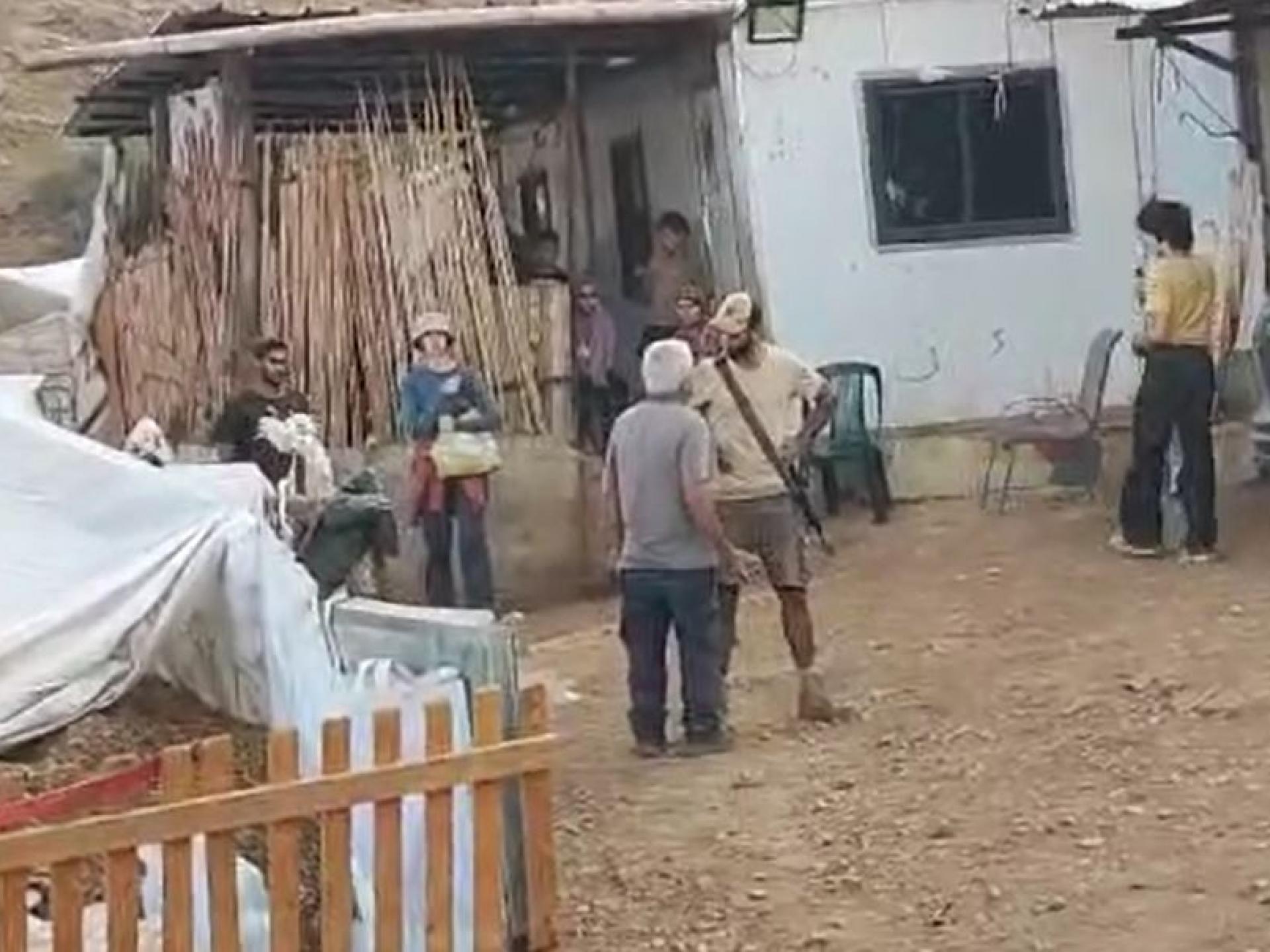In the Palestinian Jordan Valley: unceasing abuse

.It was a hard, depressing day.
We stopped at the family home of M., responsible for contact with the shepherd communities on behalf of the Palestinian Authority. M. himself was in Toubas but we met his parents who greeted us warmly and offered us tea. The father said that for the time being the situation is ‘normal’ – the colonists keep reducing and limiting their grazing grounds and the shepherds must buy feed at full price. Still, he repeatedly said he wishes peace and quiet and an end to wars.
Farisiya. An encampment of shepherd-farmers opposite Rotem, an ecological colony founded about a decade ago upon the area held by a Nahal settlement since the 1970s. One of the shepherds said they graze at a field near their village, but Didi – security official at Rotem, along with his friends – attack and chase them away, and asked that we accompany them daily. Two nights later, armed colonists invaded the village tents, and beat up children. Since then, shepherd accompaniers have kept up their presence there 24/7.
Khalet Makhoul is a shepherd community close to the religious colony of Hemdat. Burhan and his brother are harassed mainly by colonists of the two illegal outposts, one situated in the Umm Zuka nature reserve and expanding now both with structures and people, and with flocks of cattle, sheep and goats. The other outpost is closer to Hemdat, and colonists come out of it on ATVs and horseback to vandalize the shepherds.
A day before our visit, at a maneuver held by the Kfir Division (infantry stationed permanently in the West Bank), a shell hit the sheep pen of a shepherd who belongs to a community we do not accompany. As a result, 4 sheep were killed and others wounded.
As we drink tea and talk with Burhan, Abu Saker of Hadidiya calls – a shepherd community close to Ro’i colony. Soldiers, or colonists wearing army uniforms, have broken into his home and are beating up his wife!
We wanted to go there immediately but Abu Saker said that the attack ended without casualties and that the soldiers/colonists have left. Another five minutes passed and an emergency call came in again, this time from the same shepherd whose pen was hit yesterday. He told us, very scared, that he sees army forces nearby and is afraid they will impact his pen again.
We decided to go out to the ground and speak with the army units, asking them to be careful in their maneuvers so the shell incident would not be repeated. On our way we met a reserves unit. The commander made it clear that they did not participate in yesterday’s shooting and tried to connect us to the regional division’s war-room, but they refused to speak with civilians.
‘Atouf Checkpoint. This checkpoint, named after the nearby village, is crossed by water tankers from Area A that supply water to shepherds. Not freely. The latter pay much money, five times more than usual, or even at a higher price. While we were there, soldiers had most tankers cross after a careful inspection.
The soldiers let us cross to the other side of the checkpoint, where the shepherd waited for us in his car. We translated his words for the local commander, who should convey to the battalion practicing in the area to watch out for shells. The shepherd showed and explained where his pen is and begged for the army not to impact the village. He spoke excitedly and the soldiers angrily scolded him not to be loud. Apparently the occupied and oppressed must only beg quietly. Eventually the commander spoke directly with his superiors and passed them the shepherd’s request, promising us to stay on it. He then handed the shepherd back his papers and the latter went back home to his sheep.
From Burhan we understood that the shepherd does not intend to sue for damages. Apparently, he does not believe anything can result from such a complaint.
Hamra. We came to visit the women who have stayed on their own in an encampment near the illegal outpost Emeq Tirtza, home of the violent colonist Moshe Sharvit, his family and other violent colonists. The Palestinian men have left with most of the livestock to graze near Jenin, at a quiet area that still has grass. The women were glad to see us. They said colonist Moshe Sharvit has escalated his harassment since the war broke out; He comes daily, at least three times a day. On the previous day, at noon, he came with someone called Jabob, and the two roamed around the residential area and entered rooms claiming that the women were hiding an armed terrorist. On Wednesday afternoon he came and chased the flock of sheep grazing near their pen as well as the children who were looking after the sheep. In the evening, the army arrived. The soldiers concentrated the women and children outside and searched the rooms. At 3 a.m. Moshe came again with another colonist and lighting the structures and waking everyone up. He cursed and approached the children and women again, accusing them again of hiding an armed terrorist. The father of the family, Shuhdu, who must have slept there that night, answered him that they were not hiding anything and plan to leave soon. This is what the women told us.
While we were sitting there and listening to these terrible stories, Moshe and Jacob came to the encampment armed with rifles, and entered the room. “We are looking for the terrorist you are hiding!” We tried to block them while photographing them. They approached us fast, very close, cursed us as traitors and attacked the ones who were photographing them. They threw my own phone into a pail with water (I saved it just in time). Moshe demanded that we leave. We answered “we would leave when you stop harassing them”. But he was not impressed and continued to enter rooms.
In all this chaos, we summoned army and police. 4-5 soldiers arrived with an officer, a captain. The officer wanted to know what we were doing there and said we were disturbing him in doing his job. At the same time colonist Sharvit grabbed Roman’s phone – one of the accompaniers – and threw it about 20 meters away in full view of the officer. We explained that we were here to prevent this violence and asked why he wouldn’t respond to it. The commander claimed he was there only to protect colonist Moshe. “This is my job”, he said.
Finally, the soldiers left and took Sharvit with them. But the event did not end there. Moshe and Jacob continued to the neighbors’ home, the Shtaya family, and chased their sheep out of the pen. We hurried there but managed to beat up the elderly neighbor and roam around his home too. N., who recovered in the meantime, came out and distanced the flock to graze until the storm passes.
Moshe and Jacob went back to their car in the wadi and must have waited for us. We deliberated how long to stay in order to protect the women and the other families, but suddenly we had a call from Shihdi who demanded that we leave. He yelled that Sharvit was behaving this way because of us. The colonist must have threatened him and he cooperated. We left.
The next day, Sharvit came back to harass all the shepherds at Hamra. Two days later all 5 families left the place! Another village was deserted. The families must have left to a new place they rented near Jenin.
Four of our volunteers came on Saturday to help the elderly couple Shtaya pack their belongings and leave. As Meira, one of the accompaniers said, it was a heart-rending sight. The two cried bitterly. The trees they had tended beautifully in their yard were like children to them. We remembered the words of M. who was looking forward to a life of justice and equality for all, living in peace side by side.
On our way home we visited En Sukut, bringing school bags to the children who wanted them badly. In the evening, we drove back to Israel.
The report is long but even longer reports cannot described the evil, testimonies cannot bring benevolence. But all knew we must continue to try.


